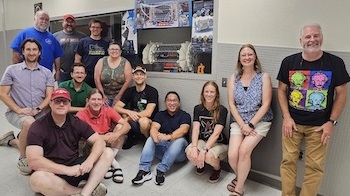Friday Flyer - March 14, 2025

Spotlight on Oklahoma State University and the University of Oklahoma
Technically, Oklahoma State University and the University of Oklahoma are two QuarkNet centers, north and south of Oklahoma City, respectively. However, they work together to make a nearly seamless QuarkNet experience for teachers. Each year, the complement of both centers has a summer workshop at either OSU or OU, alternating each year. Masterclasses are held at OSU. Teachers do some traveling, as do the mentors.
OSU had two ATLAS masterclasses in 2024 to accommodate teachers who wanted to bring students; this year, they plan on three. That is how it works out just about every year. The summer workshop in 2024 was also at OSU, where LHC fellow Jeremy Wegner worked with mentors Joe Haley (OSU) and John Stupak (OU) to facilitate a Special Relativity workshop. The 2025 edition will be at OU: let's see what they do next!


News from QuarkNet Central
International Muon Week 2025: IMW 2025 ended last week: watch the website for results.
Fermilab-based International Masterclasses 2025 Videoconferences: Started this past Monday! Going on even today! Please check out the Fermilab-based videoconference schedule to confirm the date and time (in US Central Time) of your masterclass videoconference. This schedule has been updated to include the Zoom links for the videoconferences. While you are at it, visit the Meet the Moderators page to see who our outstanding videoconference moderators are.
New in IMC 2025...Report Your Results Online: Any group of students who participate in IMC25 can make a report of their results, then submit this report for all to see. This report can be created and submitted on the masterclass day or up to one week after using a Google form, or alternatively, by email. Once it is submitted and accepted, the report is listed in a table online. More information can be found on the Communicate Your Results page.
Beamline for Schools (BL4S): BL4S is a global competition for high school students offering winning teams the unique opportunity to conduct their own physics experiment at a CERN beamline. Check out the BL4S website for more information.
Center mentors and lead teachers: QuarkNet has begun sending out award letters to centers. Now is a good time to think about dates and topics for teacher workshops this coming summer. Remember that QuarkNet has several National Workshops that QuarkNet staff and/or fellows can bring to your center. New offerings include workshops on Cosmic Watches and on AI. If you have any questions, please contact your QuarkNet staff member.
QuarkNet Educational Discussions: The next QED session will be at 7 pm CCT on Wednesday March 26. Save the date and then join in!

Physics Experiment Roundup
Let's face it: Quantum Chromodynamics is hard. The models are difficult to create and then they need to be tested for accuracy. According the APS Physics, the LHCb experiment in the Large Hadron Collider has just made QCD a little easier by its studies of charmed baryons, which provide a good test at low energy. To extract more physics, CERN goes to better engineering: support structures for CMS in high luminosity LHC and pasta-shaped magnets for ISOLDE.
There is also news, again from APS Physics, on neutrinos. If neutrinos are their own antiparticles, the AMoRE experiment might find out in its search for neutrinoless double-beta decay. It has not been found yet in the latest results, so the constraints just got tighter. The Fermilab NOvA experiment has just released results of its search for evidence of sterile neutrinos, which could help explain dark matter if they exist. Again, the constraints got tighter.

Resources
Lots of quantum physics this week!
APS Physics has some nice articles in their Quantum Milestones series: Quantum teleportation in 1993, Bell's Theorem in 1964, and the Lamb shift in 1947. A more recent milestone: a game that shows how quantum entanglement makes quantum computers faster.
APS Physics astrophysics break: star formation aided by black holes.
And back to quantum...Perimeter Institute also has interesting offerings, including a download on quantum technology and a workshop to go with it next week, on March 20. There are more quantum resources from Perimeter: take a look. They also have a video and an article to consider!

Just for Fun
We in the U.S. number our dates month first, then date. Doing that, we see something fundamental about today and every March 14 in the past and future: that's right, it's 3/14, 3.14, Pi Day! Not precise enough? Well, it was better at 1:59 in the morning or afternoon. Add 27 seconds if you like. Mind you, it is not like the old days, well, one old day and time: March 14, 1592 at 6:53:59 am or pm. We can go on. And, by the way, tomorrow is Pi Day in the Julian Calendar. Orthodox Pi Day, sort of.
After an extensive literature search, we found some "good" Pi Day jokes in the esteemed mathematics journal The Pioneer Woman (really: it was the best article our of three FF examined). Here is also a Pi Day video from TECHtalk and, if you can take it, The Pi Song from ASAP Science. And xkcd has something to say as well.
Happy Friday! Happy Pi Day!
QuarkNet Staff
Mark Adams: adams@fnal.gov
Ken Cecire: kcecire@nd.edu
Spencer Pasero: spasero@fnal.gov
Shane Wood: swood5@nd.edu
